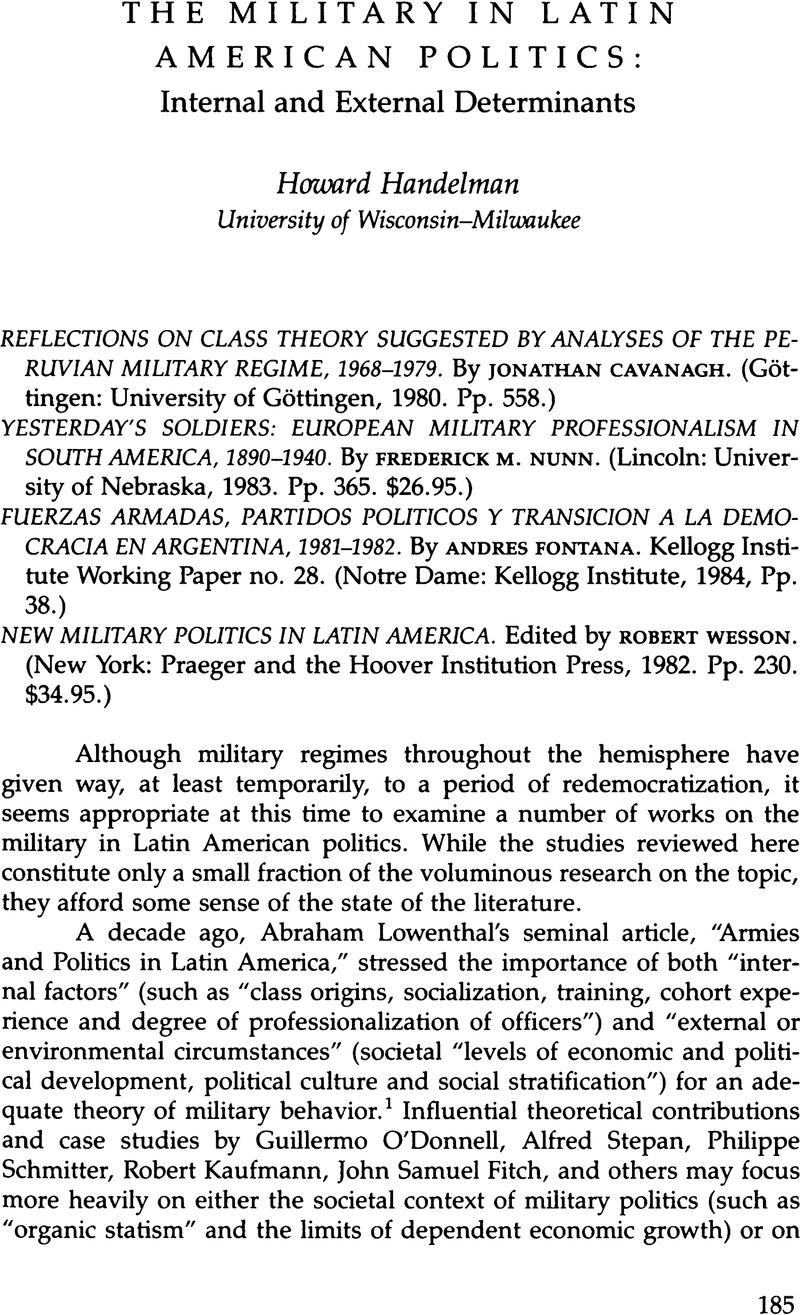No CrossRef data available.
Published online by Cambridge University Press: 12 October 2022

1. Abraham F. Lowenthal, “Armies and Politics in Latin America,” in Armies and Politics in Latin America, edited by Abraham F. Lowenthal (New York: Holmes and Meier, 1976), 12–13. The chapter was adapted from Lowenthal's article by the same name that appeared earlier in World Politics 27, no. 1 (Oct. 1974):107–30.
2. Guillermo A. O'Donnell, Modernization and Bureaucratic-Authoritarianism: Studies in South American Politics (Berkeley: Institute of International Studies, University of California, 1973); Guillermo A. O'Donnell, “Reflections on the Patterns of Change in the Bureaucratic-Authoritarian State,” Latin American Research Review 13, no. 1 (1978):3–38; Alfred Stepan, The Military in Politics: Changing Patterns in Brazil (Princeton, N.J.: Princeton University Press, 1971); Alfred Stepan, The State and Society: Peru in Comparative Perspective (Princeton, N.J.: Princeton University Press, 1978); Philippe Schmitter, Military Rule in Latin America (Beverly Hills, Calif.: Sage, 1973); Robert R. Kaufmann, Transitions to Stable Authoritarian-Corporate Regimes: The Chilean Case (Beverly Hills: Sage, 1976); and John Samuel Fitch, The Military Coup d'Etat as a Political Process: Ecuador, 1948–1966 (Baltimore: John Hopkins University Press, 1979).
3. Reinhard Bendix and Seymour Martin Lipset, Class, Status, and Power, 2nd edition (New York: Free Press, 1966); T. B. Bottomore, Classes in Modern Society (New York: Pantheon, 1966); Ralf Dahrendorf, Class and Class Conflict in Industrial Society (Stanford, Calif.: Stanford University Press, 1959); Theotônio dos Santos, Concepto de clases sociales (Buenos Aires: Editorial Galerna, 1973).
4. Samuel P. Huntington, Political Order in Changing Societies (New Haven: Yale University Press, 1969); Eric A. Nordlinger, Soldiers in Politics: Military Coups and Governments (Englewood Cliffs, N.J.: Prentice Hall, 1977).
5. Stepan, State and Society; E. V. K. FitzGerald, The State and Economic Development: Peru since 1968 (Cambridge: Cambridge University Press, 1976); Julio Cotler, Clases, estado y nación en el Perú (Lima: Instituto de Estudios Peruanos, 1978); Aníbal Quijano, “Imperialismo y capitalismo,” Sociedad y Política (Lima), no. 1 (June 1972):5–19; and Henry Pease Garría, El ocaso del poder oligárquico: lucha política en la escena oficial, 1968–75 (Lima: DESCO, 1977).
6. Liisa North and Tanya Korovkin, The Peruvian Revolution and the Officers in Power, 1967–76 (Montreal: McGill University, Center for Developing-Area Studies, 1981).
7. My own interviews with members of the economic elites in Ecuador and Uruguay uncovered little evidence of “bad conscience” on their part. Ecuadorian business leaders, for example, often admitted that income distribution in their country was very inequitable and levels of poverty disturbing. They were always quick to insist, however, that they personally were very fair in their own dealings with their employees. Frequently, they condemned the “unreasonable demands” of the labor unions and attributed any injustices in the system to historic factors that would gradually work themselves out.
8. For a more detailed critique of bureaucratic-authoritarian theory, see Karen L. Remmer and Gilbert W. Merkx, “Bureaucratic Authoritarianism Revisited,” LARR 17, no. 2 (1982):3–40.
9. The Breakdown of Democratic Regimes: Latin America, edited by Juan J. Linz and Alfred Stepan (Baltimore: John Hopkins University Press, 1978).
10. Transitions from Authoritarian Rule, edited by Guillermo O'Donnell, Philippe C. Schmitter, and Laurence Whitehead (Baltimore: John Hopkins University Press, 1986). Earlier versions of some of this work appeared as working papers at the Woodrow Wilson Center.
11. The conference entitled “Recent Electoral Changes in the Americas” was sponsored by the Center for Iberian and Latin American Studies at the University of California at San Diego, La Jolla, 21–22 Feb. 1985.
12. John J. Johnson, The Military and Society in Latin America (Stanford: Stanford University Press, 1964).
13. On Ecuador, see Osvaldo Hurtado, Political Power in Ecuador (Albuquerque: University of New Mexico Press, 1980); and Howard Handelman and Thomas Sanders, Military Government and the Movement toward Democracy in South America (Bloomington: Indiana University Press, 1981). On Peru, the much more voluminous literature includes The Peruvian Experiment: Continuity and Change under Military Rule, edited by Abraham F. Lowenthal (Princeton: Princeton University Press, 1975); The Peruvian Experiment Reconsidered, edited by Cynthia McClintock and Abraham F. Lowenthal (Princeton: Princeton University Press, 1983); Post-Revolutionary Peru: The Politics of Transformation, edited by Stephen Gorman (Boulder, Colo.: Westview, 1982); David Scott Palmer, Peru: The Authoritarian Tradition (New York: Praeger, 1980); and North and Korovkin, The Peruvian Revolution and the Officers in Power.